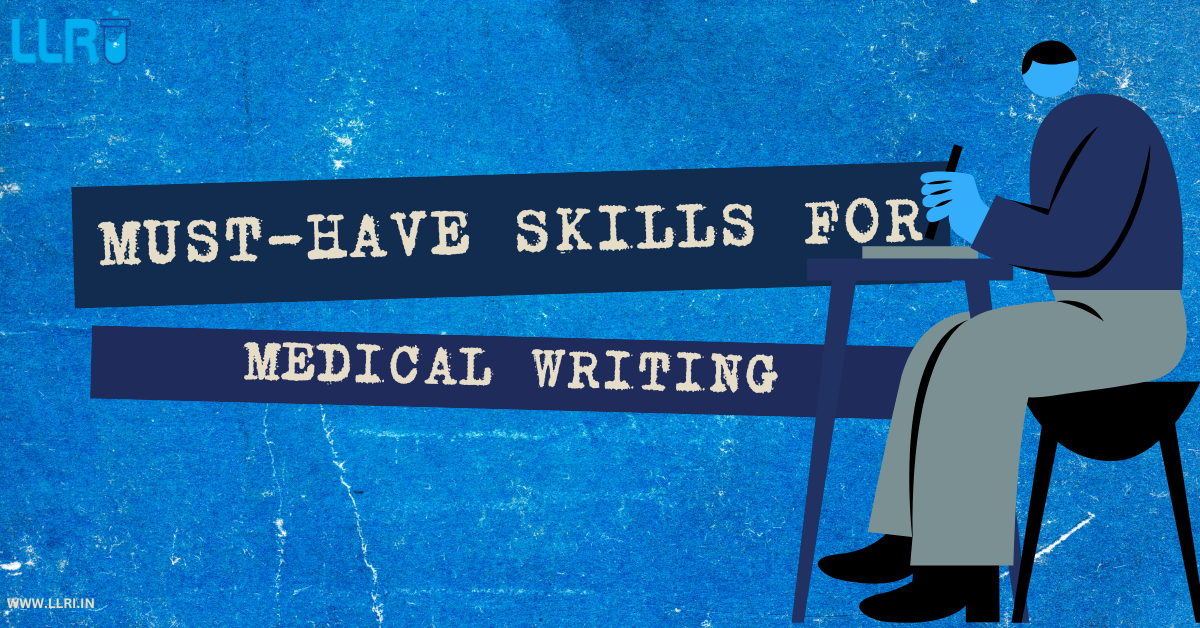Must-Have Skills For Medical Writing: If you are new to the world of medical writing, you may be wondering, “What skills do I need to become successful?” – irrespective of the profession, this is a question all beginners have!
Being an important part of healthcare and pharmaceutical industries medical writing is all about the creation of scientific documents, clinical study reports, and medical content for various audiences. And from the job hunt/career perspective – medical writing is a growing field with many career opportunities, especially in India.
The medical writing industry in India is experiencing significant growth. This trend is likely fueled by the increasing demand for high-quality documents to facilitate timely drug approvals and the recognition that the necessary skills are emerging in regions like India, according to a paper published in Medical Writing on an Accelerated Path in India by the National Institutes of Health (NIH).
This is all enough motivation for one to think – What skills are required for medical writing? Let us help you with that!

What Is Medical Writing and Why Do You Need Specific Skills?
Now, you might be thinking, “I’m a good writer; I’ve written several impressive essays and even dabbled in serious creative writing, so I can easily become a medical writer. I don’t necessarily need any specific skills.” But that’s where you are mistaken!
Medical writing involves writing scientific documents, clinical research reports, regulatory submissions, and patient information leaflets, among others. Since these documents are often technical and meant for a specialized audience, strong medical writing skills are needed to ensure clarity, accuracy, and compliance with industry standards.
Medical writing is all about communicating medical and scientific information in a clear, structured, and accurate manner. This could be anything from clinical trial reports, regulatory documents, or patient leaflets. To excel, you’ll need the right combination of skills for medical writing – and it’s not just about writing!
10 Must-Have Skills For Medical Writing
Let’s jump straight into the 10 skills that are absolutely necessary for every aspiring medical writer.
1. Research skills
Why it’s important? Well why does the sun need the sky! As a medical writer, you’ll need to sift through research papers, clinical studies, and medical journals to gather accurate data. Start practicing with simple research tasks. Get comfortable reading clinical studies and scientific papers.
2. Medical terminology knowledge
You don’t need to be a doctor, but you do need to understand medical terms. This will help you write clearly and accurately about medical topics. Start with free online resources or take a short course on medical terminology. Learning basic medical terms related to diseases, drugs, and body systems is crucial.
3. Clear and concise writing
In medical writing, clarity is everything. Complex ideas need to be made easy to understand, and that’s why having good writing skills is a must. You can practice summarizing complex topics in short, clear sentences. Use tools like Grammarly to improve grammar and style.
4. Attention to detail
Even a small error can have big consequences. You need to be precise when dealing with medical data, terminologies, and research results. Always double-check your work. Proofread multiple times, and practice identifying common mistakes.
Continue reading about the skills for medical writing here…
5. Understanding clinical research
Many medical writers are tasked with writing about clinical trials, which means knowing the clinical research process is essential. Learn about clinical trial phases, ethics, and regulatory guidelines. You can also take a course in clinical research to strengthen your understanding.
6. Data interpretation skills
Medical writers need to interpret clinical trial data, analyze statistics, and present it in an understandable format. Learn basic statistics and get comfortable with numbers. Practice explaining data in simple terms and using tables, graphs, or charts.
7. Adaptability in writing styles
As a medical writer, you’ll write for different audiences, from doctors to patients. Your writing style must adapt to the needs of each audience. Read a wide range of medical documents. Try writing for both technical audiences (like scientists) and non-technical ones (like patients).
8. Time management
Deadlines are common in medical writing, especially for regulatory submissions or clinical reports. You need to stay organized. So, use a planner or digital tools like Google Calendar to track your tasks. Prioritize your projects and stick to deadlines.
9. Proficiency with writing tools
Being proficient with tools like Microsoft Word and reference management software is key to formatting documents and managing sources. Take online tutorials on Microsoft Word and reference management tools like EndNote or Zotero. Practice using them in your writing projects.
10. Learn ethical writing practices
Medical writers must follow ethical guidelines to avoid plagiarism and ensure accurate reporting of data. Read up on ethical writing practices from organizations like the Indian Medical Writers Association or American Medical Writers Association (AMWA). Always cite your sources properly.
How Can Beginners Develop Medical Writing Skills?
Now that you know the must-have medical writing skills, here are some tips on how you can develop them as a beginner:
- Start with courses: Take certified courses in medical writing or clinical research. This will give you the technical knowledge needed.
- Practice writing: The more you write, the better you’ll become. Try summarizing medical articles, clinical trial reports, or research papers.
- Seek feedback: Ask for feedback from professionals in the field. Their guidance can help you improve your writing style and accuracy.
- Read regularly: Stay updated by reading scientific journals, medical news, and clinical reports. This keeps your research skills sharp and enhances your understanding of medical terminologies.
What Are Some Common Mistakes Beginners Make in Medical Writing?
- Overuse of jargon: Medical writers should avoid using too much jargon. While medical terms are necessary, overloading your content with jargon can make it difficult for readers to understand. Always aim for clarity.
- Not adapting to audience: Writing for different audiences is a must-have medical writing skill. Beginners often make the mistake of using the same tone for all audiences. Make sure to adjust your writing style depending on whether your audience is healthcare professionals, patients, or regulatory bodies.
- Not proofreading: Proofreading is essential to avoid mistakes. Even minor errors can change the meaning of your content. Always proofread your work or have someone else review it to ensure it is free of errors.

How Can LLRI Help You Develop Your Medical Writing Skills?
If you’re looking to develop your medical writing skills for beginners, LLRI offers certified clinical research courses that are designed to help you gain practical experience in the medical field. Our courses not only cover essential skills for medical writing but also provide job placement support to help you start your career.
At LLRI, we focus on real-world learning experiences, giving you the opportunity to work on projects and develop your must-have medical writing skills. Whether you are aiming for a career in medical writing or clinical research, our courses will prepare you with the skills and knowledge required for success.
LLRI courses help you:
- Learn the skills for medical writing through hands-on practice.
- Gain knowledge about clinical trials and the regulatory process.
- Develop strong writing techniques with guidance from experienced professionals.

